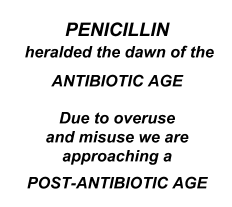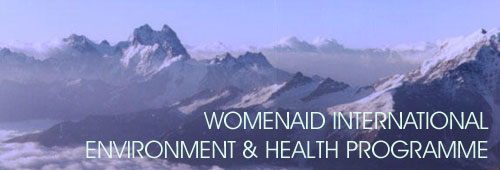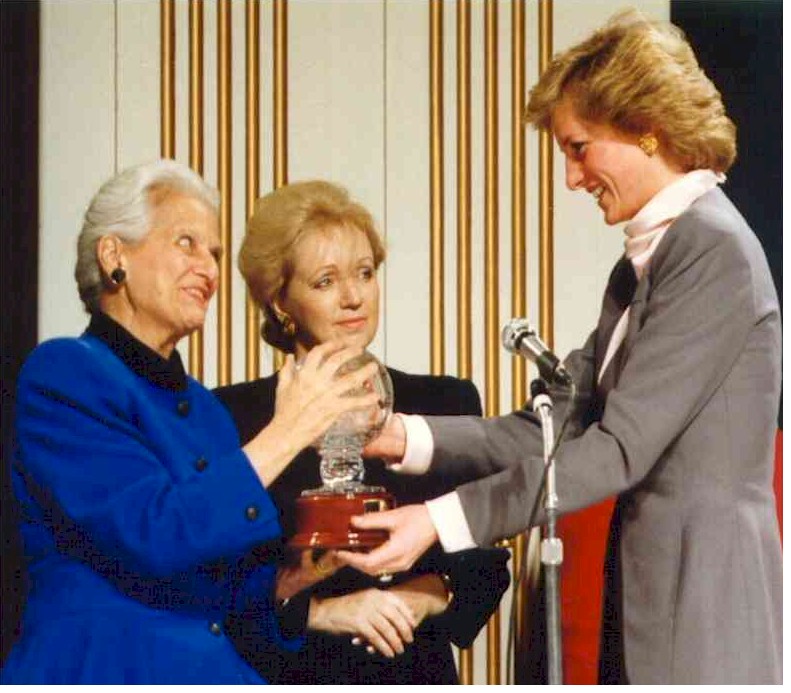70 YEARS AGO 9 OUT of 10 PEOPLE
WHO CONTRACTED PNEUMONIA DIED.
AFTER PENICILLIN WAS DISCOVERED
ONLY 1 out of 10 DIED.


A global public health crisis is looming as many bacterial organisms have, or are developing,
resistance to antimicrobials,
leading to increased deaths and escalating
associated healthcare costs.
ANTIBIOTIC RESISTANCE is now one of the
3 greatest threats to human health … source WHO
NO ACTION today means NO CURE tomorrow!
A key goal of WomenAid International is to act as a catalyst for policy and legislative change whenever necessary. Currently most people are unaware of the very real risk posed by the increasing resistance to antibiotics. There is an urgent need to improve public knowledge and understanding of antimicrobial resistance and to develop civil society involvement in awareness raising, development and implementation of containment strategies and enhanced stewardship.
WomenAid founder, Pida Ripley calls for urgent action to improve public knowledge and understanding of antimicrobial resistance and the need for enhanced stewardship; ‘We need to campaign for robust policy development and active partnerships at all levels and urge for substantial funding of a co-ordinated international programme to seek new antibiotics and develop alternative therapies. When Alexander Fleming, the discoverer of penicillin, gave his Nobel Prize speech, he warned against the overuse of penicillin as it would speed up the development of drug resistance. The world did not listen!’
Now, as many bacterial organisms have acquired, or are acquiring, resistance to antimicrobial drugs, a global public health crisis is developing leading to an increase of deaths and associated healthcare costs. In the European Union alone there are approximately 25,000 patient deaths a year due to antimicrobial drug resistance (AMR). The related health-care costs of 2.5 million extra days in hospital are well over one billion euros annually.
More than 70 per cent of the bacteria that cause hospital-related infections are already resistant to at least one type of antibacterial drug. The World Health Organisation (WHO) estimates there are at least 440,000 individual cases of multi-drug resistant tuberculosis across the globe, resulting in over 150,000 deaths annually. An untreatable form of gonorrhoea is spreading across the world and has been detected in Britain. Current routine medical practice relies on antimicrobials to protect patients from infection and if urgent measures to address antimicrobial resistance are not taken we face an alarming return to 'the pre-antibiotic era'. Some leading experts, such as the Atlanta based Center for Disease Control & Prevention (CDC), declare we are already in a ‘post-antibiotic’ world. “Antibiotic resistance is rising for many different pathogens that are threats to health,” said CDC Director Tom Frieden, M.D., M.P.H. “If we don’t act now, our medicine cabinet will be empty and we won’t have the antibiotics we need to save lives.”
Antimicrobial resistance develops because bacteria will naturally mutate and develop resilience in response to any threat posed. No antibiotic can last forever; they are a very special life-saving resource. Yet during the past decade we have fallen behind the 'mutation curve' and bacterial resilience has now become a serious and increasing global risk to human health.
This situation has developed due to a combination of four factors:
- Inappropriate antimicrobial access and prescription practices,
- Inadequate infection prevention and control practices,
- Reluctance of the pharmaceutical industry to commit further research and development for new antimicrobial agents, diagnostics and vaccines
- Weak political commitment at both national and international levels.
Most governmental responses have been inadequate - despite the adoption of resolutions on AMR by the World Health Assembly (1998, 2005) and the 2001 publication of the WHO global strategy on containment of antimicrobial resistance together with multiple recommendations to define and implement national policies, as well as numerous recommendations from international conferences and workshops.
Quite simply, AMR has not been awarded the sustained consideration and action required. There is now an urgent need for multi-sectoral planning and coordinated action on a global scale.
Belatedly governments are realizing the scale of risk to life. During the past ten years there has been a marked increase in antimicrobial resistance to certain diseases and urgent policy changes need to be implemented. However, in an era of budget cuts, action may be limited to a strategy of 'what is affordable' rather than what is 'required'. This would be a false economy for time is no longer on our side!
Key actions required are preventing infections and spread of disease, tracking resistance patterns, developing new antibiotics and diagnostic testing. As up to half of antibiotic use in humans and much of antibiotic use in animals is unnecessary, improving antibiotic stewardship – the right dose, at the right time – is critical.
CombatAMR is a Call to Action – each one of us has an important role to play. To meet the challenges of this serious health threat will require co-operation and re-education of the general public to change behaviour and expectations in antibiotic customs. Success will depend upon wide-ranging partnerships of public and private sector organisations. We need to campaign for robust global policy development, support the formation of active partnerships at all levels and press for substantial funding of a co-ordinated international programme dedicated to searching for new antibiotics and developing alternative therapies.
No action today means no cure tomorrow!
It is imperative to remember that antibiotics are a precious limited resource. 70 years ago 9 out of 10 people who contracted pneumonia died. After penicillin was discovered by Alexander Fleming in 1928 and subsequently made widely available in the 1940s, only 1 out 10 people died. Only by working together will we prevail.
Play your part by using antibiotics sensibly
and only when appropriate.
Always complete the prescription.
For more information visit
http://www.combatamr.org http://www.eurosurveillance.org
http://www.who.int/drugresistance/en https://antibiotic.ecdc.europa.eu/en
https://www.gov.uk/government/collections/european-antibiotic-awareness-day-resources
https://www.gov.uk/government/publications/uk-5-year-antimicrobial-resistance-strategy-2013-to-2018
https://www.gov.uk/government/policy-advisory-groups/advisory-committee-on-dangerous-pathogens







